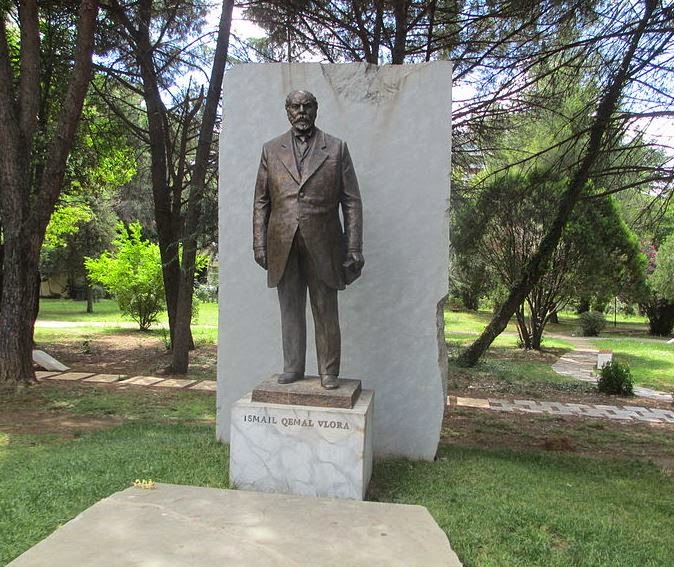embarked on a career as an Ottoman civil servant, being identified with the liberal reform wing of the service under Midhat Pasha, and was governor of several towns in the Balkans.
During these years he took part in efforts for the standardization of the Albanian alphabet and the establishment of an Albanian cultural association.
By 1877, Ismail seemed to be on the brink of important functions in the Ottoman administration, but when Sultan Abdulhamid II dismissed Midhat as prime minister, Ismail Qemali was sent into exile in western Anatolia, though the Sultan later recalled him and made him governor of Beirut.
However, his liberal policy recommendations caused him to fall out of favour with the Sultan again, and in May 1900 Ismail Qemali boarded the British ambassador's yacht and claimed asylum. He was conveyed out of Turkey and for the next eight years lived in exile, working both to promote constitutional rule in the Ottoman Empire and to advance the Albanian national cause within it.
After the Young Turk Revolution of 1908, he became a deputy in the restored Ottoman Parliament, working with liberal politicians and the British. In 1909, during a rising against the Young Turks, he was briefly made President of the Ottoman National Assembly but was forced to leave Constantinople forever a day or two later. Thereafter his political career concentrated solely on Albanian nationalism.
The Athens embassy of the Ottoman Empire reported that Qemali negotiated with organization financed by wealthy Tosks and Greece about forging a union. During the Albanian Revolt of 1911 he joined the leaders of the revolt at meeting in a village in Montenegro (Gerče) on 23 June and together they draw up "Gerče Memorandum" (sometimes referred to as "Red Book" because of the color of its covers ) which addressed their requests both to Ottoman Empire and Europe (in particular to the Great Britain).
He was a principal figure in the Albanian Declaration of Independence and the formation of the independent Albania in 28 November 1912. This signaled the end of almost 500 years of Ottoman rule in Albania. Together with Luigj Gurakuqi, he raised the flag on the balcony of the two-story building in Vlorë where the Declaration of Independence had just been signed. The establishment of the government was postponed for the fourth session of the Assembly of Vlorë, held on 4 December 1912, until representatives of all regions of Albania arrived to Vlore.
Qemali was prime minister of Albania from 1912 to 1914. In November 1913, Albanian pro-Ottoman forces had offered the Albanian throne to the Ottoman war minister of Albanian origin, Izzet Pasha. The Ottoman Empire sent agents to encourage a revolt, hoping to restore Ottoman suzerainty over Albania.
Izzet Pasha sent major Beqir Grebenali, another ethnic Albanian, to be one of his chief representatives in Albania. The Provisional Government of Albania under control of Ismail Qemali captured and executed major Beqir Grebenali. Such provocative and damaging display of independence of Qemali's government angered Great Powers and International Commission of Control forced Qemali to step aside and leave Albania.
During World War I, Ismail Qemali lived in exile in Paris, where, though short of funds, he maintained a wide range of contacts and collaborated with the correspondent of the continental edition of the Daily Mail, Somerville Story, to write his memoirs.
His autobiography, published after his death, is the only memoir of a late Ottoman statesman to be written in English and is a unique record of a liberal, multicultural approach to the problems of the dying Empire. In 1918, Ismail Qemali travelled to Italy to promote support for his movement in Albania, but was prevented by the Italian government from leaving Italy and remained as its involuntary guest at a hotel in Perugia, much to his irritation.
He died of an apparent heart attack at dinner there one evening. Ismail Qemali is depicted on the obverses of the Albanian 200 lekë banknote of 1992–1996, and of the 500 lekë banknote issued since 1996. On 27 June 2012, Albanian President, Bamir Topi decorated Qemali with the Order of the National Flag .





